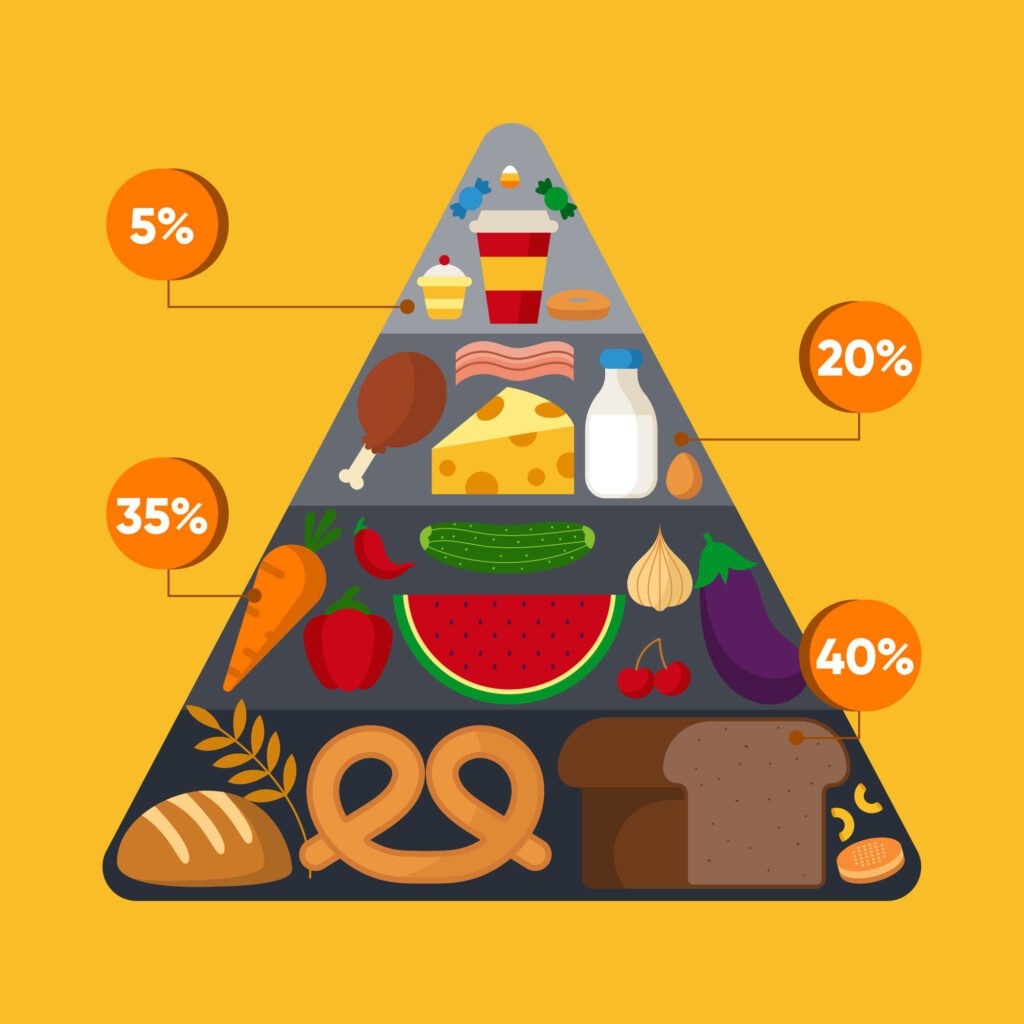Table of Contents
Introduction
Complete nutrition is the foundation of a vibrant, energetic, and healthy life. It’s crucial to assuring your body gets all the nutrients it needs to perform efficiently, from your brain to your muscles, your vulnerable system, and beyond. In today’s fast-paced world, where convenience frequently trumps nutrition, understanding how to achieve complete nutrition can feel like a daunting task. But it does n’t have to be.
In this comprehensive companion, we’ll explore everything you need to know about complete nutrition what it is, why it matters, and how to achieve it through balanced eating, smart food choices, and understanding your body’s unique requirements.

What’s Complete Nutrition?
Complete nutrition refers to a diet that provides all the essential nutrients your body needs to serve optimally. These nutrients include macronutrients—carbohydrates, proteins, and fats and micronutrients, similar to vitamins and minerals, as well as water and fiber.
Your body requires a balanced input of these factors to perform vital functions like energy production, muscle form, vulnerable defense, and indeed mood regulation. Achieving complete nutrition ensures that your body operates efficiently, leading to increased energy situations, bettered internal clarity, enhanced physical performance, and overall well-being.
Why Does Complete Nutrition Matter?
Nutrition plays a centenarian part in every aspect of your health. When your body receives the right nutrients in the right quantities, it thrives. Still, when crucial nutrients are missing or imbalanced, your body may struggle to perform its introductory functions, leading to fatigue, illness, and long-term health problems.
Then there are many crucial reasons why complete nutrition matters
Energy Production The food you eat provides the energy your body needs to produce energy. Without the right blend of nutrients, your energy situations can dip, leaving you feeling tired and sluggish.
Immune Support A well-nourished body is better equipped to fight off infections and illness. Nutrients like vitamins C, D, and zinc play critical roles in supporting vulnerable function.
Muscle form and Growth Protein and other essential nutrients are vital for muscle recovery, making complete nutrition important for anyone involved in physical exertion or strength training.
Mental Health Nutritional imbalances can affect brain function and mood. scarcities in crucial nutrients like omega- 3 adipose acids, B vitamins, and magnesium have been linked to depression, anxiety, and cognitive decline.
Disease Prevention A diet rich in whole, nutrient-dense foods can reduce your threat of habitual conditions similar to heart complaints, diabetes, and cancer.
The factors of Complete Nutrition
Achieving complete nutrition requires a balanced input of macronutrients, micronutrients, and other vital salutary rudiments. Let’s break down each of these orders.
- Macronutrients
Macronutrients are the primary structure blocks of your diet and give the energy your body needs to serve.

- Carbohydrates: Carbohydrates are your body’s main source of energy. They’re broken down into glucose, which is used to fuel your brain, muscles, and other apkins. Whole grains, fruits, vegetables, and legumes are excellent sources of complex carbohydrates, which give sustained energy and essential nutrients like fiber and vitamins.
- Proteins: Proteins are essential for towel form, vulnerable function, and muscle growth. They’re made up of amino acids, some of which your body can not produce on its own and must gain from food. Good sources of protein include spare fish, eggs, dairy products, sap, and factory-ground sources like tofu and tempeh.
- Fats: Fats are pivotal for brain health, hormone products, and energy stores. Healthy fats, similar to those set up in avocados, nuts, seeds, and adipose fish like salmon, give essential adipose acids like omega-3s, which support cardiovascular and cognitive health. It’s important to concentrate on healthy fats while minimizing trans fats and inordinately impregnated fats from reused foods.
- Micronutrients
Micronutrients are vitamins and minerals that play critical roles in colorful biochemical processes, despite being demanded in lower amounts than macronutrients.

- Vitamins: Vitamins are organic composites that are vital for maintaining fleshly functions. They can be divided into water-answerable (similar to vitamin C and the B vitamins) and fat-answerable (similar to vitamins A, D, E, and K). Each vitamin plays a unique part, from supporting your vulnerable system to maintaining healthy skin and bones.
- Minerals: Minerals are inorganic rudiments that help with everything from bone health (calcium) to oxygen transport (iron) and fluid balance (sodium and potassium). A diet rich in fruits, vegetables, whole grains, and spare proteins helps insure you get a variety of minerals.
Water: The Essential Nutrient for Life
Water is frequently undervalued as a critical nutrient, but it’s essential for survival. It plays several vital roles, including regulating body temperature, aiding digestion, transporting nutrients, and removing waste from the body. Staying doused ensures that all fleshly functions operate easily. Aim to drink around 8 spectacles (22 liters) of water daily to maintain optimal hydration, although individual requirements may vary depending on factors such as exertion position and climate.
The significance of Fiber for Digestive Health
Fiber, a form of carbohydrate that the body ca n’t digest, is pivotal for maintaining digestive health. There are two types of fiber: answerable and undoable. Answerable fiber dissolves in water and helps lower cholesterol and stabilize blood sugar, while undoable fiber adds bulk to coprolite and prevents constipation. Both are crucial to supporting gut health, perfecting digestion, and promoting malnutrition. Including a variety of high-fiber foods, such as fruits, vegetables, legumes, and whole grains, in your diet helps regulate blood sugar situations and keeps the digestive system performing well.
12 Essential Ways to Master Complete Nutrition
Achieving complete nutrition can feel inviting, but by following these 12 practicable way, you can produce a balanced, nutrient-rich life that supports optimal health and energy.
Step 1: Prioritize Whole Foods
Whole foods similar as fruits, vegetables, spare proteins, whole grains, and healthy fats are nutrient-rich and minimally reused. They give essential vitamins, minerals, and other nutrients that are frequently lacking in reused foods. By fastening on whole foods, you insure your diet is rich in the nutrients your body needs to thrive.
Step 2: Balance Macronutrients
To achieve complete nutrition, it’s essential to consume a balanced blend of carbohydrates, proteins, and fats. Each macronutrient serves specific places in the body; carbohydrates give energy, proteins form and make apkins, and fats support brain health and hormone product. A balanced diet should include all three macronutrients in applicable proportions.

Step 3: Focus on High-Quality Proteins
Not all protein sources are created equal. conclude for spare proteins similar as flesh, fish, eggs, sap, and factory-ground options like tofu and lentils. These give essential amino acids without the redundant impregnated fats set up in red meat and reused proteins, supporting muscle growth, towel form, and vulnerable health.
Step 4: Incorporate Healthy Fats
Healthy fats, similar to omega- 3 adipose acids from adipose fish and flaxseeds, are critical for brain health, reducing inflammation, and supporting heart health. Avoid trans fats and limit your input of impregnated fats, which are generally set up in fried and reused foods. rather, concentrate on including fats from sources like avocados, nuts, seeds, and olive oil painting.
Step 5: Choose Complex Carbohydrates
Complex carbohydrates set up in whole grains, legumes, and vegetables give a steady force of energy and are rich in fiber, vitamins, and minerals. They also help regulate blood sugar situations. Refined carbohydrates, similar as those in sticky snacks and white chuck , can lead to energy crashes and nutrient scarcities, so it’s stylish to limit them.
Step 6: Cargo Up on Vegetables and Fruits
Fruits and vegetables are packed with vitamins, minerals, antioxidants, and fiber. These nutrients help cover your cells from damage, reduce inflammation, and support overall health. Aim to fill half your plate with various fruits and vegetables to insure you’re getting a variety of nutrients from different food sources.

Step 7: Stay Doused
Water is vital for every fleshly function, from digestion to nutrient immersion. It helps transport nutrients throughout the body and flushes out poisons. Drinking enough water menial can help dehumidify-related issues like fatigue, headaches, and bloodied attention. Make a habit of drinking water regularly throughout the day, especially when active.
Step 8: Plan Balanced diet
Planning your diet ensures you’re constantly eating a balanced diet. Strive to include a source of protein, healthy fats, complex carbohydrates, and vegetables in each meal. Preparing recipes ahead of time also helps avoid unhealthy food choices when you are busy or on the go.
Step 9: help Nutrient scarcities
Nutrient scarcities can lead to colorful health problems, similar as fatigue, weakened impunity, and poor internal function. Regularly eating a different array of nutrient-dense foods helps insure you get all the vitamins and minerals your body needs. Pay special attention to nutrients like iron, vitamin D, and magnesium, which are generally lacking in numerous diets.
Step 10: Listen to Your Body
Your body’s nutritional requirements are dynamic and can change based on age, exertion position, and health conditions. Pay attention to hunger cues, how you feel after eating certain foods, and any signs of nutrient scarcities. This mindfulness can help you conform your diet to meet your body’s specific conditions.
Step 11: Supplement Wisely
While food should be your primary source of nutrients, there are times when supplements can be salutary, especially if you have specific nutrient scarcities or salutary restrictions. Always consult with a healthcare professional before taking supplements to insure they’re necessary and won’t intrude with any specifics or conditions.
Step 12: Practice temperance
Achieving complete nutrition is n’t about strict diets or barring certain food groups; it’s about balance. Enjoy treats and indulgent foods in temperance, while fastening on nutrient-rich, whole foods the maturity of the time. A balanced approach allows you to maintain a healthy relationship with food while supporting long-term health and well-being.
Challenges to Achieving Complete Nutrition
Achieving complete nutrition, despite being a fundamental aspect of health, presents several challenges that individuals often face. One of the most significant hurdles is the overwhelming variety of nutrients required by the body. Ensuring a diet rich in all essential vitamins, minerals, proteins, fats, and carbohydrates can be difficult, especially given modern lifestyles, where processed and convenience foods often dominate. Moreover, nutritional needs vary between individuals due to factors such as age, activity level, health status, and even genetics. People often overlook or misunderstand the importance of micronutrients—like zinc, magnesium, and vitamin D—which play critical roles in bodily functions but may be deficient in typical diets. Additionally, conflicting nutritional advice and trends can confuse individuals about what truly constitutes a “complete” diet, often leading them to follow fad diets that may focus on certain nutrients while neglecting others. For those with dietary restrictions, such as vegetarians, vegans, or people with food allergies, achieving a comprehensive intake of nutrients becomes even more complex, requiring careful planning and, at times, supplementation. The challenge also extends to education, as many people lack the nutritional literacy to make informed food choices. To master complete nutrition, individuals must navigate these various obstacles, balancing nutrient density with personal needs while avoiding misinformation and unhealthy shortcuts.

Related Questions:
What is complete nutrition?
Complete nutrition is a balanced intake of all essential nutrients required for the body to function optimally. It ensures proper energy, growth, immune function, and overall health by including the right mix of macronutrients and micronutrients.
1.Macronutrients:
Carbohydrates: Provide energy for daily activities (e.g., grains, fruits).
Proteins: Help build and repair muscles and tissues (e.g., meat, beans).
Fats: Support brain health and energy storage (e.g., oils, nuts, fish).
2.Micronutrients:
Vitamins & Minerals: Support various body functions such as immunity, bone strength, and cellular repair.
Benefits of Complete Nutrition:
Enhanced energy levels: proper energy distribution from carbs, proteins, and fats.
Better Immune Function: Micronutrients support the immune system.
Healthy Growth & Development: Necessary for cell repair, muscle growth, and organ function.
Prevention of Deficiencies: Ensures the body gets nutrients it cannot produce on its own.
A variety of whole foods like vegetables, fruits, whole grains, lean proteins, and healthy fats provide the foundation for complete nutrition.
Is buying food or supplements from Complete Nutrition considered a healthier option?
Buying food or supplements from brands like “Complete Nutrition” offers convenience and targeted nutrition, but whole foods are generally a healthier option.
Benefits:
Convenient and designed to cover nutrient gaps.
Targeted for fitness or specific health goals.
Considerations:
Whole foods provide more complete nutrients (fiber, antioxidants).
Risk of oversupplementation with certain products.
While supplements can help in specific cases, a balanced diet of whole foods is usually the better choice for overall health.
If we eat frozen food, do we get complete nutrition from the frozen food?
Frozen foods can provide complete nutrition if they are whole, minimally processed, and balanced in macronutrients (carbs, proteins, fats) and micronutrients (vitamins, minerals). Freezing preserves most nutrients, but there are some considerations:
Benefits:
Nutrient Preservation: Freezing locks in vitamins and minerals, especially in vegetables and fruits, soon after harvest.
Convenience: Easy access to a variety of foods year-round.
Limitations:
Nutrient Loss: Some water-soluble vitamins (like vitamin C and B-vitamins) can degrade during the freezing or reheating process.
Added ingredients: Processed frozen meals may contain added salt, sugar, or unhealthy fats.
Frozen whole foods can provide complete nutrition, but processed frozen meals may not be as nutritious due to added ingredients.
By eating which single thing can we get complete nutrition?
No single food provides complete nutrition on its own. However, certain foods are highly nutrient-dense and come close to offering a wide range of essential nutrients. Here are a few examples:
1. Eggs:
Eggs are often called a “superfood” because they contain nearly all essential vitamins and minerals, plus high-quality protein and healthy fats.
2. Quinoa:
A complete plant-based protein, quinoa offers all nine essential amino acids, along with fiber, vitamins, and minerals like magnesium and iron.
3. Salmon:
Rich in omega-3 fatty acids, high-quality protein, vitamins D and B, and minerals like selenium, salmon supports brain, heart, and overall health.
4. Spirulina:
This algae is packed with protein, B vitamins, iron, and antioxidants, making it one of the most nutrient-dense foods available.
A varied diet is still necessary for complete nutrition.
Наркологическая клиника: анонимное лечение зависимости без огласки
наркологический центр в спб http://narcologicheskaya-klinika-spb4.ru/ .
Современные решения для диспетчерских центров – полный цикл услуг
оборудование диспетчерских центров https://www.osnashcheniye-dispetcherskogo-tsentra1.ru/ .
Как видеостены меняют рекламный рынок: Новые тренды 2024 года
видеостена eliteboard http://www.videostena-moskva1.ru .
Как оснастить конференц-зал: советы по выбору оборудования
конференц залы оборудование http://www.osnashcheniye-konferents-zala1.ru .
Быстрые и безопасные грузоперевозки по Москве — надёжное решение для вашего бизнеса
доставка грузов по москве доставка грузов по москве .
Профессиональное оснащение конференц-залов: Решения для успешных мероприятий
конференц зал оборудование оснащение проект конференц зал оборудование оснащение проект .
Оборудование для переговорных комнат: проектирование, установка и настройка систем
оборудование для переговорных комнат https://oborudovaniye-peregovornoy1.ru/ .
Временная регистрация в арендуемом жилье: Как сделать всё правильно и законно
временная регистрация для граждан рф http://www.registraciya-vremennaya-moskva.ru .